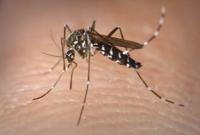
Serving the Vermont Champlain Valley Area for 45 Years
Main SectionsFront Page SportsValley VitalsIt's in the StarsStarwiseArchivesLinksAbout The VoiceContact Us |
West Nile Virus Detected in Addison County
|
|
Tuesday September 15, 2009
By Mike Cameron
In the wake of published reports about increased local mosquito activity in recent days, the Valley Voice has learned that test pools used by Vermont State entomologists have shown positive results for mosquitoes that were infected with the West Nile Virus.
The pools tested were located near Brandon and Cornwall. Both pools were located in or near swamp and marsh land. Statewide, four positive test pools have been evaluated as being positive for the disease, (the pools(groups of insects) contained mosquito species that tested positive for West Nile Virus in 2009.) Two dead birds were also found to be infected with the disease in Vermont so far in 2009. No infected birds were found in Addison County.
Citizen concern about the possibility of increased risk of illness from West Nile Virus due to the recent upswing in the mosquito populations most recently here in Addison County after an unusually wet summer has prompted the Voice to contact an expert in the field of Vermont mosquito research. This scientist monitors the test sites (pools) in question and has studied the West Nile Virus and other insect-borne disease issues in Vermont for a number of years.
Last Friday, September 11th, 2009 we spoke with Alan Graham Vector Management Specialist for the Division of Agricultural Resource Management and Environmental Stewardship, Vermont Agency of Agriculture and he confirmed that West Nile Virus has been found in the test pools mentioned in the beginning of this article.
“West Nile Virus is here in Vermont and has been here for some time. Not all mosquitoes carry the virus. The ones that do can infect a bird that in turn can infect another bird and then another mosquito that feeds on the infected bird. It then passes the disease on to humans,” Graham explained. “The recent increase in mosquitoes this year here in Vermont has to do with an increase in the temperature after a cooler than normal summer of 2009 and the fact that it has been wet as well. Mosquitoes do not do well in temperatures below 50-degrees ferinheigth. They can not fly at that point. With the first heavy frost arrives most of the mosquitoes will be gone. Some species however do winter here in Vermont.” He explained further.
Graham went on to explain that not all species carry the West Nile Virus and that those that do seem to be particularly well suited to breeding and growing in man made environments right in our own back yards. Notable breeding areas include bird baths where the water has become stagnant. Plastic sheeting, puddles and pools of water left standing and unattended, pretty much anything that will collect water and not drain or dry up before the mosquitoes arrive and make it their home. There is also an interesting rub to all of this. In a more natural setting like a marshland or swamp, natural predators can and do maintain a kind of system of checks and balances to each year’s new population of these nasty little critters.
Most of the mosquitoes that carry West Nile Virus are more apt to be living and breeding in the man made environments according to the latest scientific research. Getting rid of standing water near your home or business that may be collecting in pails, old sheets of plastic or tarps, an unattended child’s plastic pool, old tires and the like is a beacon for these potentially harmful pests.
How can you prevent WNV? Don’t get bit. Use repellent with at least 15-percent DEET for kids and more for adults…Graham uses 40-percent DEET and says that even that will only last for about one hour and a half. Long sleeves, tuck in pants, and a hat, head net or both are recommended. Full bug suits are available at sporting goods stores. The risk of conducting activities in an area where mosquito activity is high becomes a personal matter. Public warnings have not occurred and we at the Voice have not been made aware that any are planned at this point.
Does that fact that WNV having been found in Addison County pose an immediate major public health risk for our residents? It does not appear to be the case. The reasoning is that the mosquito season is almost over for this year. A cool summer has kept the pests in check for the greater part of this year’s cycle. People who feel that they have come in contact with WNV infection should ask their doctor if a treatment regimen is right for them.
Moreover, there has not been widespread scientific evidence of WNV disease in humans or infected birds or test pools with infected insects in them over the past several years in our area. Vermont has collected mosquito and WNV data dating back to 2002. The Center for Disease Control explains on their website that “approximately 80 percent of people (about 4 out of 5) who are infected with WNV will not show symptoms at all.”
About one in 150 people infected with the disease will develop serious health consequences and some can be permanent. 20 percent of those infected suffer milder, non-permanent symptoms according to the CDC. Folks over 50 are at a higher risk to get severe illness. Most, milder cases of WNV improve on there own.
Vermont scientists and biologists as well as the medical community will be keeping a watchful eye on WNV. Helpful websites include www.cdc.gov and
 Printer Friendly Printer Friendly
|
Top |
Advertisements
Search our Archives
Agricultural Weather Forecast:

© 2006-18 The Valley Voice • 656 Exchange St., Middlebury, VT 05753 • 802-388-6366 • 802-388-6368 (fax)
Valleywides: [email protected] • Classifieds: [email protected] • Info: [email protected]
